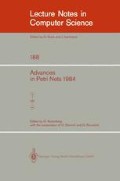Abstract
We have seen that F1, F2, F a3 can be computed with the help of polynomial algorithms, without unfolding the net. This allows A not to be given in extension, what is often useful or even necessary in the modelling of systems. We are building a tool which uses these algorithms.
The example 2 shows that it would be useful to look for other classes of flows, or, at least, for refinement of the classes already presented. An other interesting question would be to know the cases where F0 is covered by F1, F a3 .
At last, we think that it will be possible to extend our calculus to all Pr/Tr-nets. Meanwhile, one can transform Pr/Tr-nets into UP/T-nets as it is shown by the last example.
Preview
Unable to display preview. Download preview PDF.
References
Brams G.W.: Réseaux de Petri: Théorie et pratique. Masson editeur, Paris (1983).
Chevalley C.: Fundamental concepts of algebra. Academic press inc — Publishers — New York (1956).
Fiorot J.C.; Gondran M.: Résolution des systèmes linéaires en nombres entiers. Bulletin de la direction des Etudes et Recherches EDF, Série C, No2 (1969).
Genrich H.J.; Lautenbah K.: Predicate/Transition-nets. Net Theory and Application, Lect. Notes Comput. Sci. 84 (1980).
Genrich H.J.; Lautenbach K.: S-invariance in Predicate/Transition-nets. Applications and Theory of Petri-nets, Informatik Fachberichte 66 (1983).
Kannan R.; Bachem A.: Polynomial algorithm for computing the Smith and Hermite normal forms of an integer matrix. Report 7895-OR, Institut fur Okonometrie und Operations Research, Univ. Bonn (1978).
Jensen K.: Coloured Petri-nets and the invariant-method. DAIMI PB-104, Aarhus University (1979).
Jensen K.: High-level Petri-nets. Applications and Theory of Petri-nets, Informatik Fachberichte 66 (1983).
Lautenbach K.; Pagnoni A.: Liveness and duality in marked-graph-like Pr/Tr-nets. Proc. of the 4th European Workshop on Application and Theory of Petri-nets, Toulouse, France (1983).
Lautenbach K.; Schmid H.: Use of Petri-nets for proving correctness of concurrent process systems. Information Processing 1974, North-Holland Pub. Co. (1974).
G. MEMMI Methodes d'analyse de réseaux de Petri, réseaux a files et applications aux systèmes temps réel. Thèse de doctorat d'Etat, Université P. et M. Curie, Paris (1983).
Mevissen H.: Algebraische bestimmung von S-invarianten in Pr/Tr-netzen. ISF-Report 81.01, 12 Oktober 1981 (1981).
Reisig W.: Petri-nets with individual tokens. Applications and Theory of Petri-nets, Informatik Fachberichte 66 (1983).
Author information
Authors and Affiliations
Editor information
Rights and permissions
Copyright information
© 1985 Springer-Verlag Berlin Heidelberg
About this paper
Cite this paper
Vautherin, J., Memmi, G. (1985). Computation of flows for unary-predicates/transitions-nets. In: Rozenberg, G. (eds) Advances in Petri Nets 1984. Lecture Notes in Computer Science, vol 188. Springer, Berlin, Heidelberg. https://doi.org/10.1007/3-540-15204-0_25
Download citation
DOI: https://doi.org/10.1007/3-540-15204-0_25
Published:
Publisher Name: Springer, Berlin, Heidelberg
Print ISBN: 978-3-540-15204-0
Online ISBN: 978-3-540-39320-7
eBook Packages: Springer Book Archive

